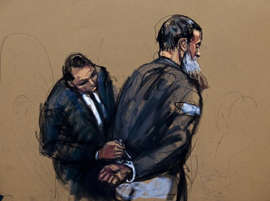
© Jane Rosenberg/Reuters A courtroom sketch shows Nazih al-Ragye known by the alias Abu Anas al-Liby as he appears in Manhattan Federal Court for an arraignment in New York, October 15, 2013.
A suspected al-Qaeda terrorist died Friday night just days before he was slated to go on trial in New York on charges of helping plan the 1998 East Africa embassy bombings, his lawyer said.
Nazih Abdul-Hamed al-Ruqai was diagnosed with advanced liver cancer after U.S. commandos and FBI agents captured him in a 2013 raid outside his house in a suburb of Tripoli.His lawyer, Bernard Kleinman, said his client’s condition had deteriorated significantly in the last month. Kleinman said Ruqai, 50, died at a hospital in the New York area.
Kleinman did not know the exact cause of death, and he declined to say more about his client’s final hours.
There were questions about whether Ruqai would ever be able to be prosecuted because of his illness. A Manhattan federal judge had scheduled jury selection to begin Jan. 12 and refused to separate Ruqai — despite his medical condition — from the other remaining defendant in the case.
Ruqai, also known as Anas al-Libi, was charged with conspiracy to commit murder. Two other men were also accused in the bombing case: Khalid Al Fawwaz, a Saudi, and Adel Abdel Bary, an Egyptian.
Both were extradited from Britain in 2012. Last year, Bary pleaded guilty to terrorism charges. He faces a maximum of 25 years behind bars.
Ruqai had close ties to al-Qaeda and moved to Sudan in 1992 to work for Osama bin Laden, U.S. intelligence officials have said.
While in Sudan, Ruqai was sent to Kenya to conduct surveillance on possible targets for an al-Qaeda operation, according to a federal indictment and former U.S intelligence officials.
Kleinman says his client was innocent and had severed his ties with al-Qaeda well before the 1998 attack.
The bombings outside the U.S. embassies in Tanzania and Kenya killed 224 people, including 12 Americans. Among the dead were two CIA employees.
The FBI declined to comment on Ruqai’s death.
Officials were unaware that Ruqai had cancer when he was apprehended. He was known to be suffering from hepatitis C.
No comments:
Post a Comment